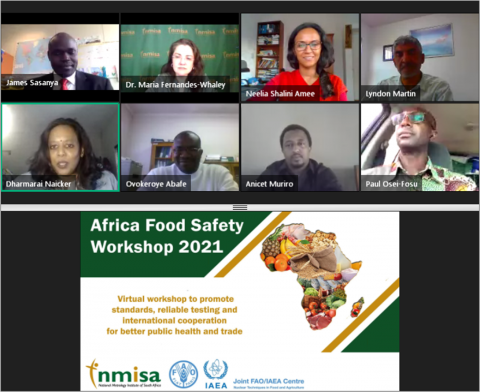BD World Food Day
NMISA Enables Food Safety Testing Within The AfCFTA
Metrology is the science of measurement and its application. Principally, it focuses on providing confidence, reliability, and a common understanding of measurement units that ensures that the measurements made are accurate, correct and can be trusted.
International trade affects everyone, as it involves the foods we consume and the foods we export to other markets. Global food trade has increased the amount and variety of foods offered to consumers, but this has also increased the need for regulation regarding the safety of food grown and developed locally as well as the food products we import. In the case of international trade where suppliers might be in one part of the world and potential customers in another, harmony between food safety standards and practices has become vital.
Where manufacturers and inspectors produce measurement results for the same food products. metrological traceability is needed to ensure that the results are comparable. Metrological traceability is the process of linking back the measurement result to a common reference. This is important because in essence it allows consumers and law enforcement to compare apples with apples. Over the years, technological advances placed stringent demands on metrology to develop rapidly, which requires new measurement methods and standards. The provision of measurement services and the production of reference materials have also become integral parts of modern National Metrology Institutes (NMIs).
The increase in free trade agreements, the tri-partite free trade agreement especially the Africa Continental Free Trade Area (AfCFTA), will likely lead to an increase in technical barriers to trade (TBTs) to protect national markets. To mitigate this risk, trade partners require an able and efficient metrology structure to negate TBTs. The trade of agricultural commodities, within AfCFTA, would need to be underpinned through accurate testing by competent analytical laboratories that are responsible for ensuring food safety and quality prior to human/ animal consumption. The International Standard ISO\IEC 17025 for testing and calibration laboratories prescribes the regular use of appropriate reference materials and regular participation in proficiency testing schemes as critical requirements towards ensuring the reliability of analytical test results.
In 2015, the National Metrology Institute of South Africa (NMISA) initiated a reference material programme to enable food trade in support of Africa’s growth strategies and trade agreements by providing Africa-relevant reference materials (RMs) and Proficiency Testing (PT) schemes that would allow laboratories to demonstrate the comparability of their testing results. These services have been delivered within South Africa and the Africa Food Safety Network, targeting testing needs for priority food contaminants such as mycotoxins, pesticide residues and heavy metals within the agricultural sectors for maize, ground nuts, cassava, wheat, cocoa, processed foods, and fruit. Customised nutritional content- food labelling PT schemes and RMs were also delivered in support of national health promotion strategies and the drive to reduce non-communicable diseases such as heart disease, strokes, and malnutrition.
The availability of locally produced metrologically traceable reference materials and PT reference values has not only shortened the metrological traceability chain for the region but has also proven invaluable for the consistent evaluation of laboratory performance and measurement result comparability. NMISA’s reference materials and PT schemes focus on food safety and quality challenges within the region. These products are regionally relevant, immediately accessible, sustainable, and Proudly South African.
For more information about NMISA’s reference materials, PT Schemes and other offerings, visit our website www.nmisa.org or send an e-mail to pt@nmisa.org. You may also shop at our online store https://store.nmisa.org/.
Website: www.nmisa.org.






 Sign-up and receive the Business Media MAGS newsletter OR SA Mining newsletter straight to your inbox.
Sign-up and receive the Business Media MAGS newsletter OR SA Mining newsletter straight to your inbox.